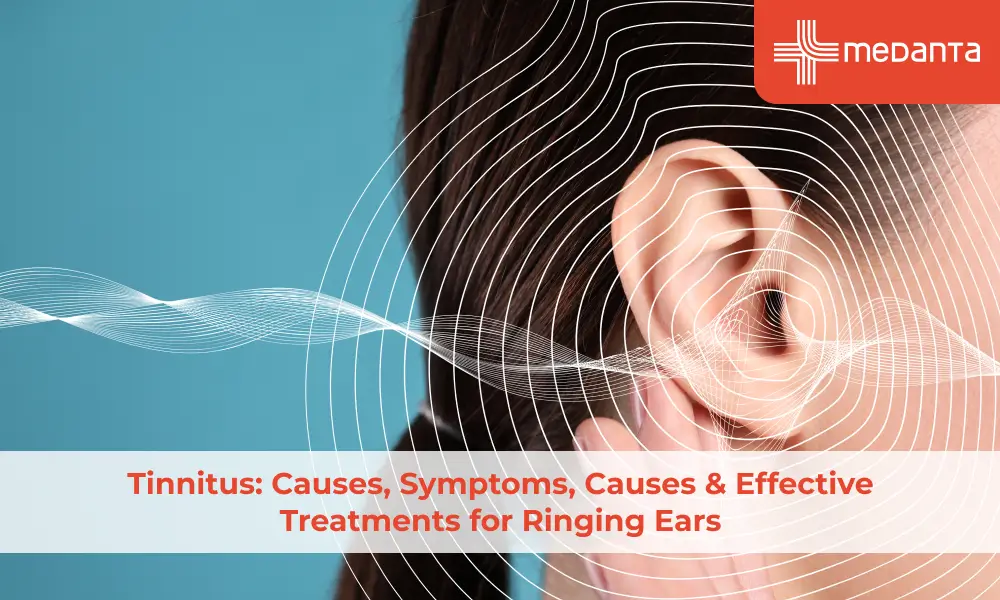Tinnitus: Causes, Symptoms, Causes & Effective Treatments for Ringing Ears

TABLE OF CONTENTS
Have you ever had constant buzzing, ringing, or even whooshing sounds in your ears? Doctors often call this tinnitus. It can mess with your focus, disrupt your sleep, and affect how you feel overall.
Tinnitus is the medical name for hearing noises in your ears when no external sounds are present. These noises sound very different depending on who you ask. Sometimes, you might not even know what caused it. A lot of things can lead to tinnitus. Loud sounds at music events or job sites as well as health issues like high blood pressure or fibromyalgia, can play a role. Older people seem to experience it more often.
This guide dives into what tinnitus is, looks at its possible causes, and talks about treatments that can help.
What Does Tinnitus Mean?
Tinnitus happens when people hear sounds that have no outside source. These noises are internal so others cannot hear them making it a very personal health issue. Studies show that tinnitus affects between 10-25% of adults and can also occur in younger people. Most patients say they hear ringing, but the noises can also sound like buzzing, roaring, whistling, or hissing.
Why Do Ears Ring?
Scientists do not understand the exact causes of tinnitus, but most cases include hearing loss. Many things can lead to tinnitus:
Being around loud noise at work, concerts, or sports games
Hearing worsening with age
Build-up of earwax or having ear infections
Taking certain drugs like aspirin, NSAIDs, or some antibiotics
Head or neck injuries
Different Types of Tinnitus
Doctors separate tinnitus into two main types:
Subjective tinnitus is the most common kind. The patient notices these sounds. It results from unusual activity in how the brain processes sounds.
Objective tinnitus happens less often. Sometimes a doctor can hear these sounds too using a stethoscope. This type often comes from actual physical noises in the body, like those from blood vessels near the ear.
Conditions and Risk Factors Linked to Tinnitus
Tinnitus often occurs with other health problems. Most people with tinnitus also experience hearing loss. Other related health issues include:
Ear infections
Ménière's disease
Problems with the temporomandibular joint
Growths like an acoustic neuroma
Different autoimmune diseases
Ageing, being male, smoking, and drinking alcohol all make people more likely to get tinnitus.

Diagnosis
Figuring out if a person has tinnitus involves taking a detailed look at:
Medical history and physical assessment: The doctor asks about symptoms, how long they've been happening, what makes them worse, and if there are any other related health problems. They will also check the ears, head, and neck to look for anything unusual.
Hearing tests (audiometry): Most patients need hearing tests because they help connect tinnitus to any hearing problems. Most of the time, hearing loss is involved.
Tympanometry: This test checks how the eardrum and middle ear move. It can show if there is fluid or something stuck inside.
Specialised tinnitus sound matching allows doctors to measure how loud or high-pitched a person's tinnitus is.
Doctors often suggest imaging tests like CT scans or MRIs when the tinnitus is one-sided or has a pulsing quality. These tests help doctors check if there are issues like tumours or blood vessel problems that need attention.
Treatment
Treatments focus on easing symptoms rather than curing tinnitus. There are several proven methods that help:
White noise machines or sound maskers provide therapy using sound.
Hearing aids help people who also have trouble hearing.
Cognitive behavioural therapy has some of the best research backing it up.
Tinnitus retraining therapy combines talking sessions with sound-based methods.
Ways to Handle Tinnitus
People use several methods to cope with tinnitus, including:
Playing background sounds to mask ringing
Learning to relax
Staying active
Avoiding triggers like too much caffeine, drinking alcohol, or loud noises might help decrease symptoms.
When to Visit an ENT Doctor
Seeing a specialist becomes important if:
Hearing disappears alongside tinnitus
You hear sounds in one ear or hear pulsing noises
You have neurological issues along with tinnitus
Even though no complete cure exists, specialists have ways to help manage it, so it's worth getting checked out if the problem doesn't go away.
FAQs
Can tinnitus be treated?
No cure exists to eliminate tinnitus. Treating the root causes, like removing earwax, can sometimes lead to resolution. Most treatments aim to manage symptoms rather than get rid of them.
What causes tinnitus the most?
Hearing loss is the biggest contributor to tinnitus. Other frequent causes include:
Exposure to loud noise
Build-up of earwax
Certain drugs NSAIDs and some antibiotics
Injuries to the head or neck
Does stress make tinnitus worse?
Stress has a big influence on how bad tinnitus feels. Studies show that 44% of people report mild to moderate stress, while 31% face severe to extreme stress. Many individuals notice that their symptoms worsen when they are under pressure.
Are there any drugs that help with tinnitus relief?
No drugs get rid of tinnitus. Doctors might give antidepressants or anti-anxiety medicines to handle related issues. They often suggest tricyclic antidepressants such as amitriptyline or nortriptyline.
When should tinnitus cause concern?
You should see a doctor if you have:
Tinnitus in one ear
Sounds that match your heartbeat
Sudden hearing loss along with tinnitus
Tinnitus combined with vertigo
These could mean there are serious health problems that need urgent care.






